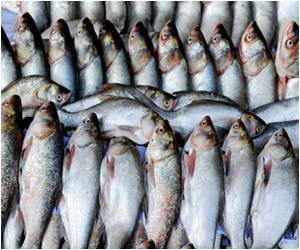Researchers conducted a study to assess the relationship between fish intake and risk of cerebrovascular disease. Couple of weekly portions of oily fish can help ward off stroke, reveal study results.
The scientists believed that eating oily fish can significantly reduce risk of stroke but fish oil supplements do not provide similar effects. Fish contains omega 3 fatty acids and closely related to decreased threat of cerebrovascular ailments. The scientists recommend eating two portions of oily fishes such as sardines and mackerel, which will help in lowering the risk of cerebrovascular diseases.Prof. Chowdhury along with colleagues analyzed the outcome of 38 studies to evaluate the association of fish intake and risk of mini-stroke or stroke. About 800,000 people in 15 countries were involved in these 38 studies. People with established cardiovascular diseases were also included in these studies. Dietary questionnaires were used to assess the intake of fish; omega 3 fatty acid was identified by blood markers and the use of fish oil supplements was recorded. During the study about 4,817 cerebrovascular events were noticed.
The researchers observed that two to four fish servings per week resulted in moderate but 6 percent reduced risk of cerebrovascular risk. It was also seen that those who took five or more fish servings per week, had 12 percent lower risk of cerebrovascular diseases.
An increase of two servings a week resulted in 4 percent reduced risk of cerebrovascular diseases while fish oil supplements and omega 3 fatty acid level were not considerably related with altered risk of cerebrovascular ailments. The scientists said that there are various reasons accounting for the positive impact of consuming fish on vascular health for instance vitamins, minerals and essential amino acids present in fish help in reducing the risk of cerebrovascular diseases.
Fish eating provides better benefits as compared to red meat that are harmful to vascular health. High intake of fish is concerned with healthy diet and better socioeconomic status. White fish and oily fish differ largely in the way they are cooked. White fish is generally deep fried and battered thereby adding harmful fats and oily fish is cooked with less oil and fat.
The scientists were of the opinion that there might be other hidden factors responsible for the results. They concluded by saying, they reinforce a potentially modest beneficial role of fish intake in the cause of cerebrovascular disease”.
The scientists from the Division of Human Nutrition at Wageningen University proposed, in the editorial accompanying the BMJ, that although it would be advisable for patients to eat one or two servings of fish per week and this can reduce their risk cardiovascular diseases, the benefits are surely small as compared to other measures taken by patients for improvising their overall wellness.
Reference:
Association between fish consumption, long chain omega 3 fatty acids, and risk of cerebrovascular disease: systematic review and meta-analysis; Rajiv Chowdhury et al; BMJ 2012
Source-Medindia















